Financial Accounting Principles: Report on Stakeholders and Reporting
VerifiedAdded on 2020/10/23
|31
|3435
|289
Report
AI Summary
This report provides a comprehensive overview of financial accounting principles. It begins by defining financial accounting and its purpose, followed by an explanation of accounting rules (personal, real, and nominal accounts) and key principles (objectivity, matching, revenue recognition, consistency, accrual, and conservatism). The report then identifies internal (employees, managers) and external stakeholders (government, shareholders, customers) of a large business, detailing their interests in financial information. It further examines the qualitative characteristics of financial reporting (understandability, relevance, reliability, and comparability) and their impact on decision-making for public limited companies. The report also includes practical examples of double-entry recordings, trial balance, and financial statements like the statement of profit and loss and the statement of financial position. Finally, it explains accounting concepts such as consistency and prudence and describes the purpose and methods of depreciation in accounting statements. The report aims to provide a clear understanding of financial accounting for effective decision-making.
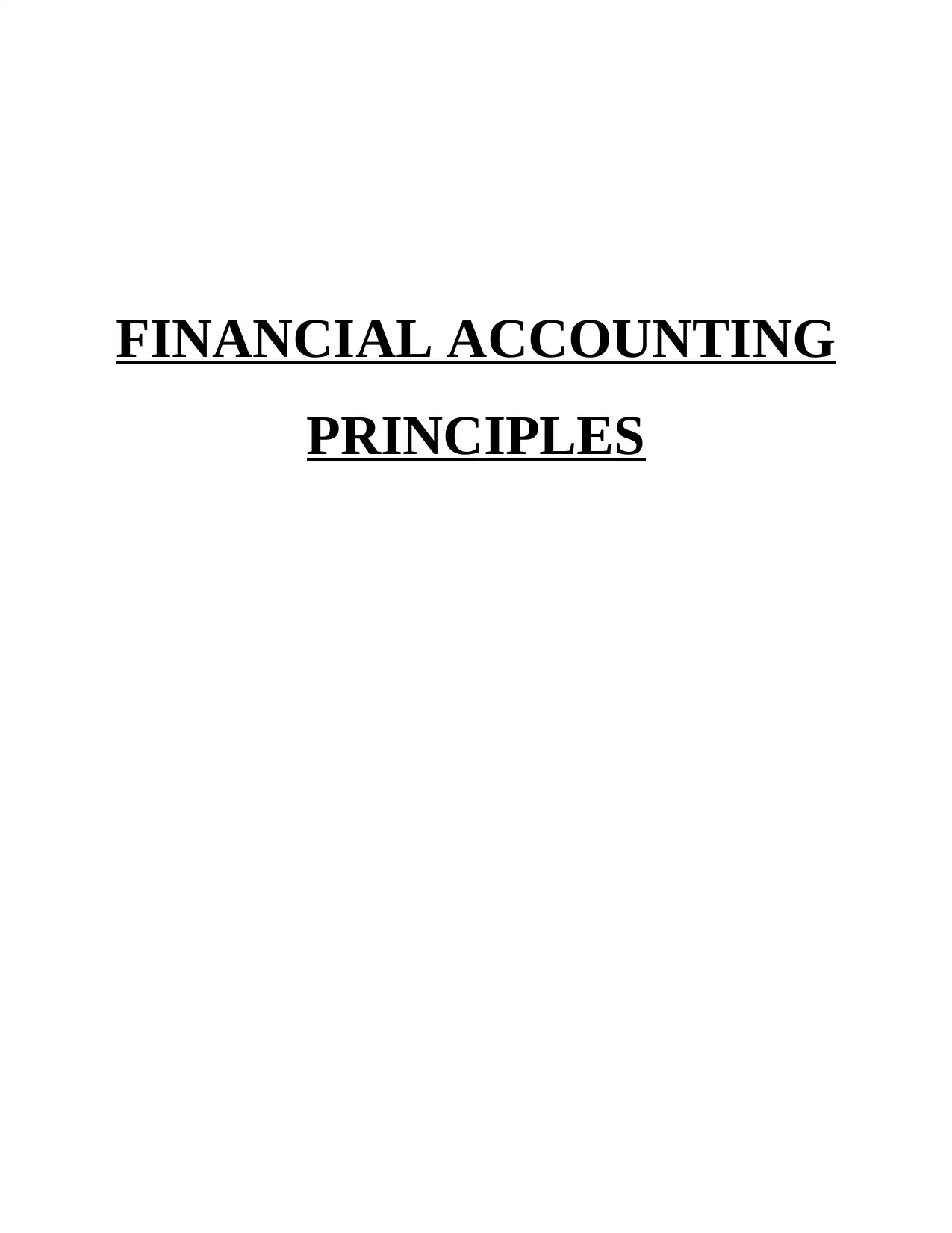
FINANCIAL ACCOUNTING
PRINCIPLES
PRINCIPLES
Paraphrase This Document
Need a fresh take? Get an instant paraphrase of this document with our AI Paraphraser
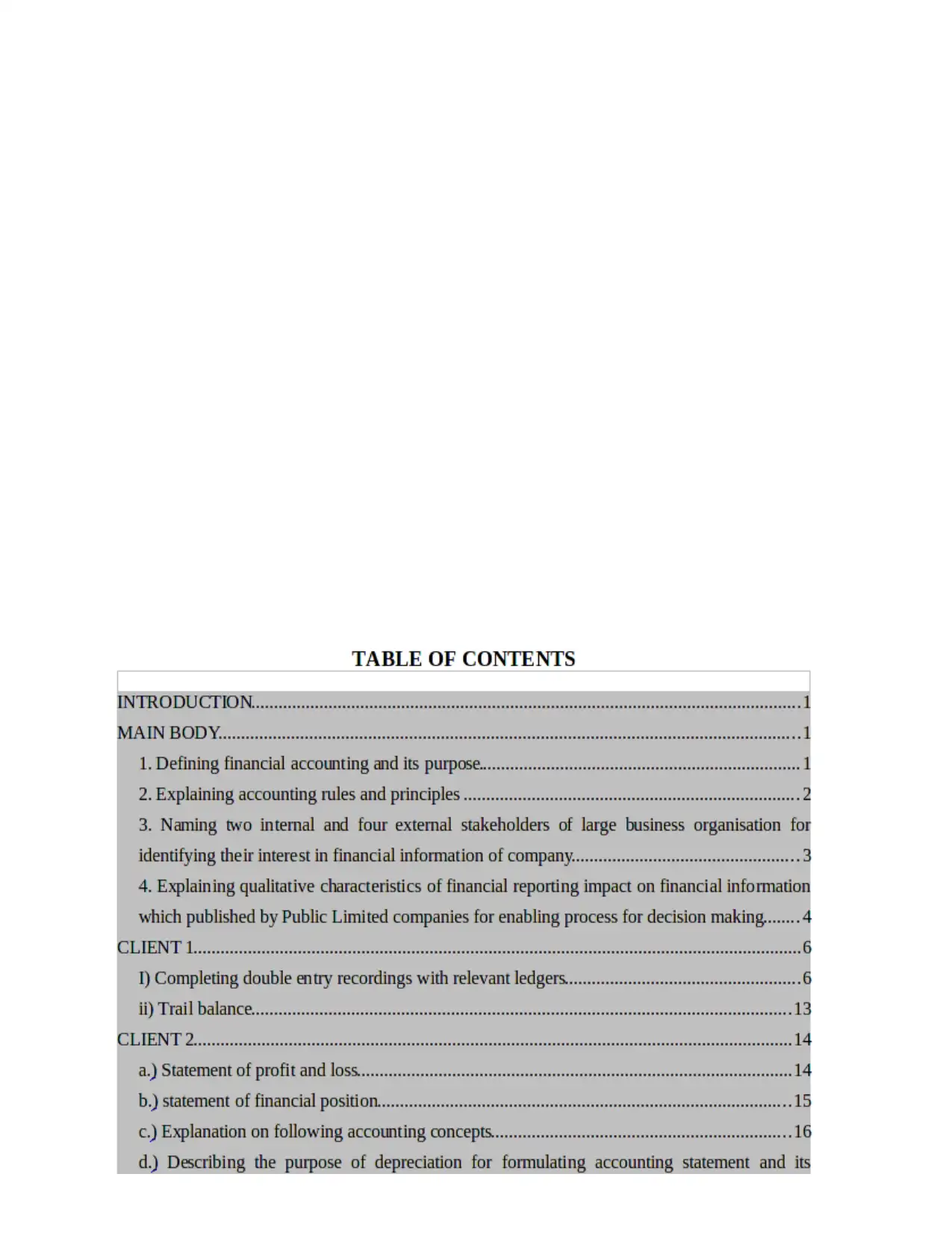
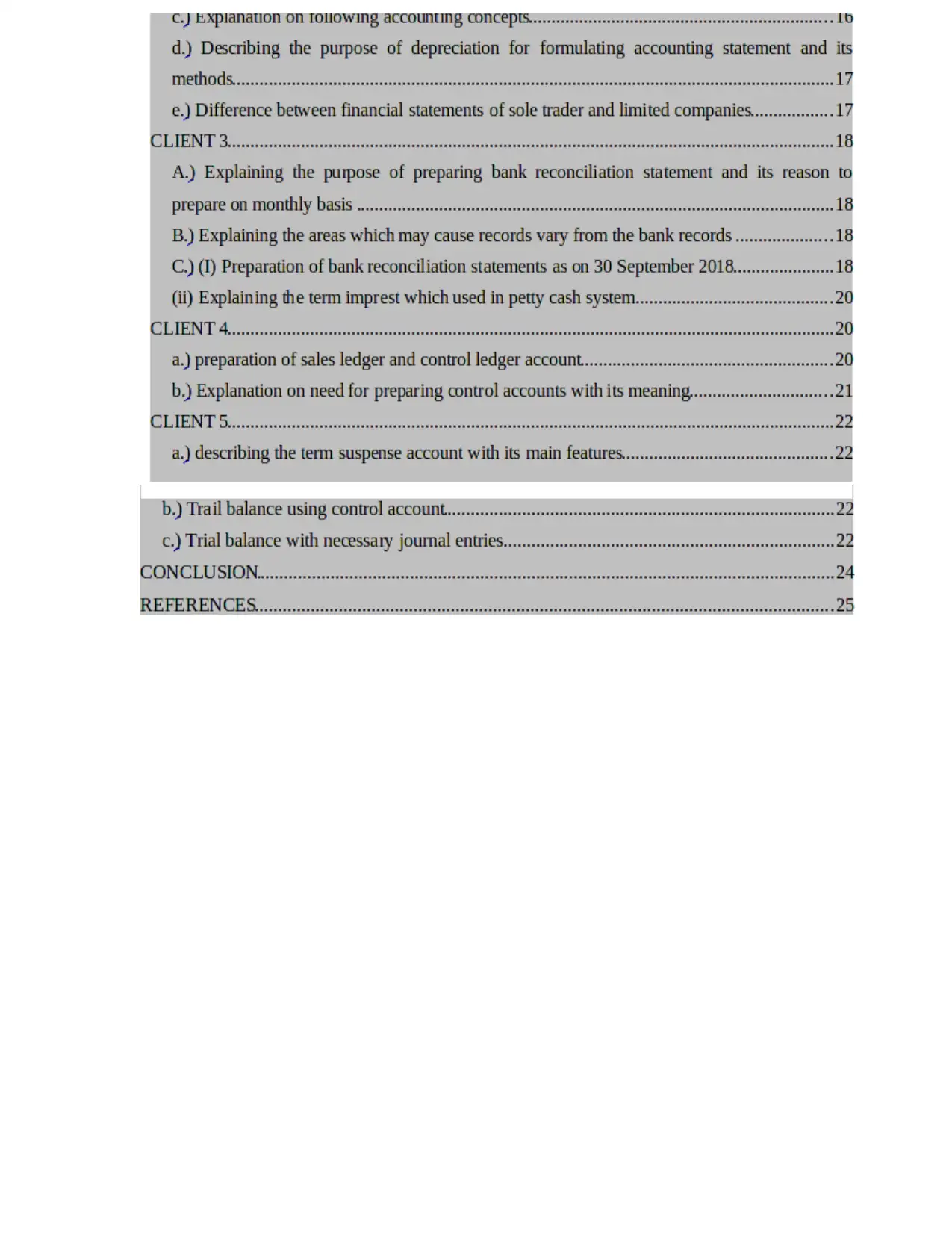
⊘ This is a preview!⊘
Do you want full access?
Subscribe today to unlock all pages.

Trusted by 1+ million students worldwide

Paraphrase This Document
Need a fresh take? Get an instant paraphrase of this document with our AI Paraphraser
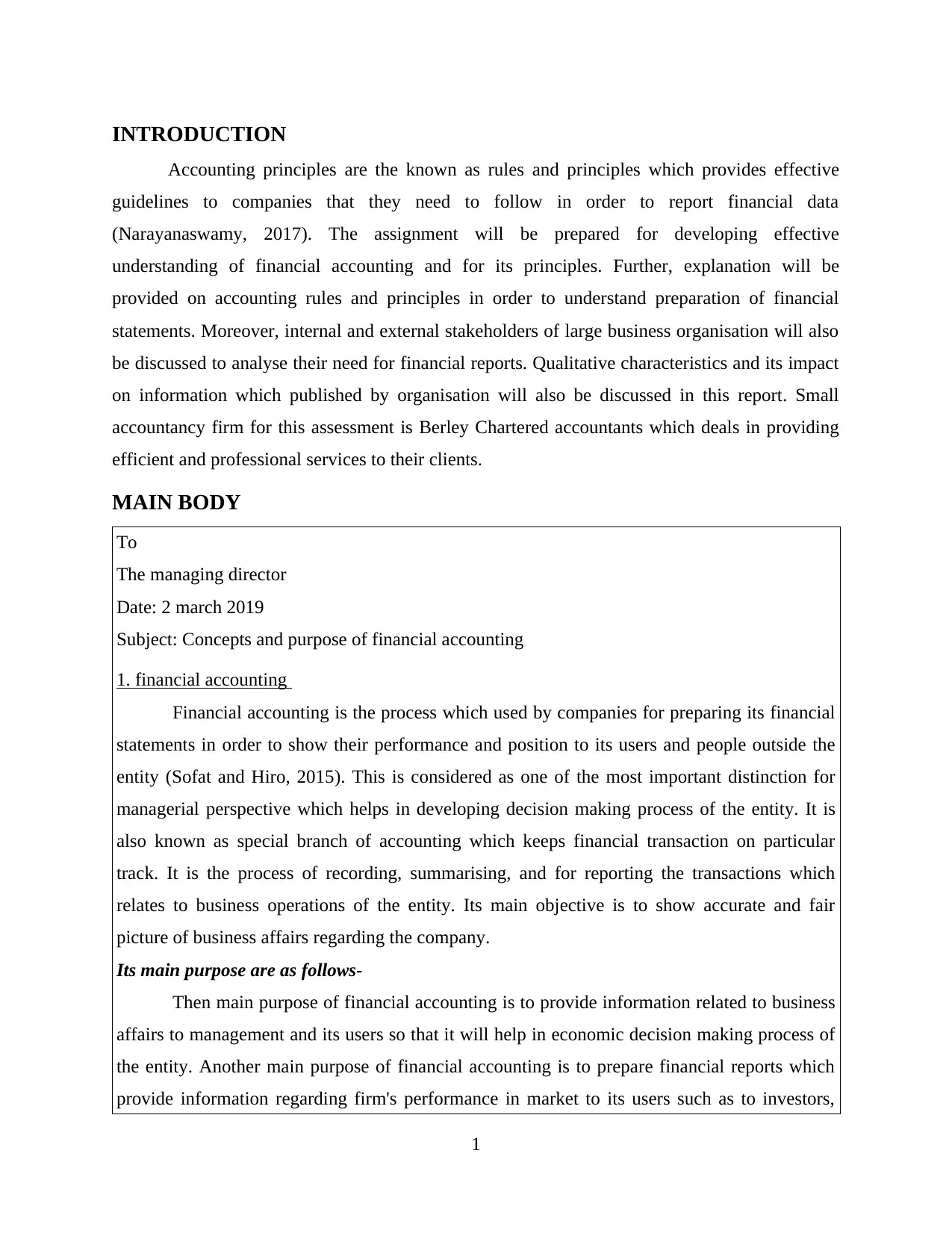
INTRODUCTION
Accounting principles are the known as rules and principles which provides effective
guidelines to companies that they need to follow in order to report financial data
(Narayanaswamy, 2017). The assignment will be prepared for developing effective
understanding of financial accounting and for its principles. Further, explanation will be
provided on accounting rules and principles in order to understand preparation of financial
statements. Moreover, internal and external stakeholders of large business organisation will also
be discussed to analyse their need for financial reports. Qualitative characteristics and its impact
on information which published by organisation will also be discussed in this report. Small
accountancy firm for this assessment is Berley Chartered accountants which deals in providing
efficient and professional services to their clients.
MAIN BODY
To
The managing director
Date: 2 march 2019
Subject: Concepts and purpose of financial accounting
1. financial accounting
Financial accounting is the process which used by companies for preparing its financial
statements in order to show their performance and position to its users and people outside the
entity (Sofat and Hiro, 2015). This is considered as one of the most important distinction for
managerial perspective which helps in developing decision making process of the entity. It is
also known as special branch of accounting which keeps financial transaction on particular
track. It is the process of recording, summarising, and for reporting the transactions which
relates to business operations of the entity. Its main objective is to show accurate and fair
picture of business affairs regarding the company.
Its main purpose are as follows-
Then main purpose of financial accounting is to provide information related to business
affairs to management and its users so that it will help in economic decision making process of
the entity. Another main purpose of financial accounting is to prepare financial reports which
provide information regarding firm's performance in market to its users such as to investors,
1
Accounting principles are the known as rules and principles which provides effective
guidelines to companies that they need to follow in order to report financial data
(Narayanaswamy, 2017). The assignment will be prepared for developing effective
understanding of financial accounting and for its principles. Further, explanation will be
provided on accounting rules and principles in order to understand preparation of financial
statements. Moreover, internal and external stakeholders of large business organisation will also
be discussed to analyse their need for financial reports. Qualitative characteristics and its impact
on information which published by organisation will also be discussed in this report. Small
accountancy firm for this assessment is Berley Chartered accountants which deals in providing
efficient and professional services to their clients.
MAIN BODY
To
The managing director
Date: 2 march 2019
Subject: Concepts and purpose of financial accounting
1. financial accounting
Financial accounting is the process which used by companies for preparing its financial
statements in order to show their performance and position to its users and people outside the
entity (Sofat and Hiro, 2015). This is considered as one of the most important distinction for
managerial perspective which helps in developing decision making process of the entity. It is
also known as special branch of accounting which keeps financial transaction on particular
track. It is the process of recording, summarising, and for reporting the transactions which
relates to business operations of the entity. Its main objective is to show accurate and fair
picture of business affairs regarding the company.
Its main purpose are as follows-
Then main purpose of financial accounting is to provide information related to business
affairs to management and its users so that it will help in economic decision making process of
the entity. Another main purpose of financial accounting is to prepare financial reports which
provide information regarding firm's performance in market to its users such as to investors,
1
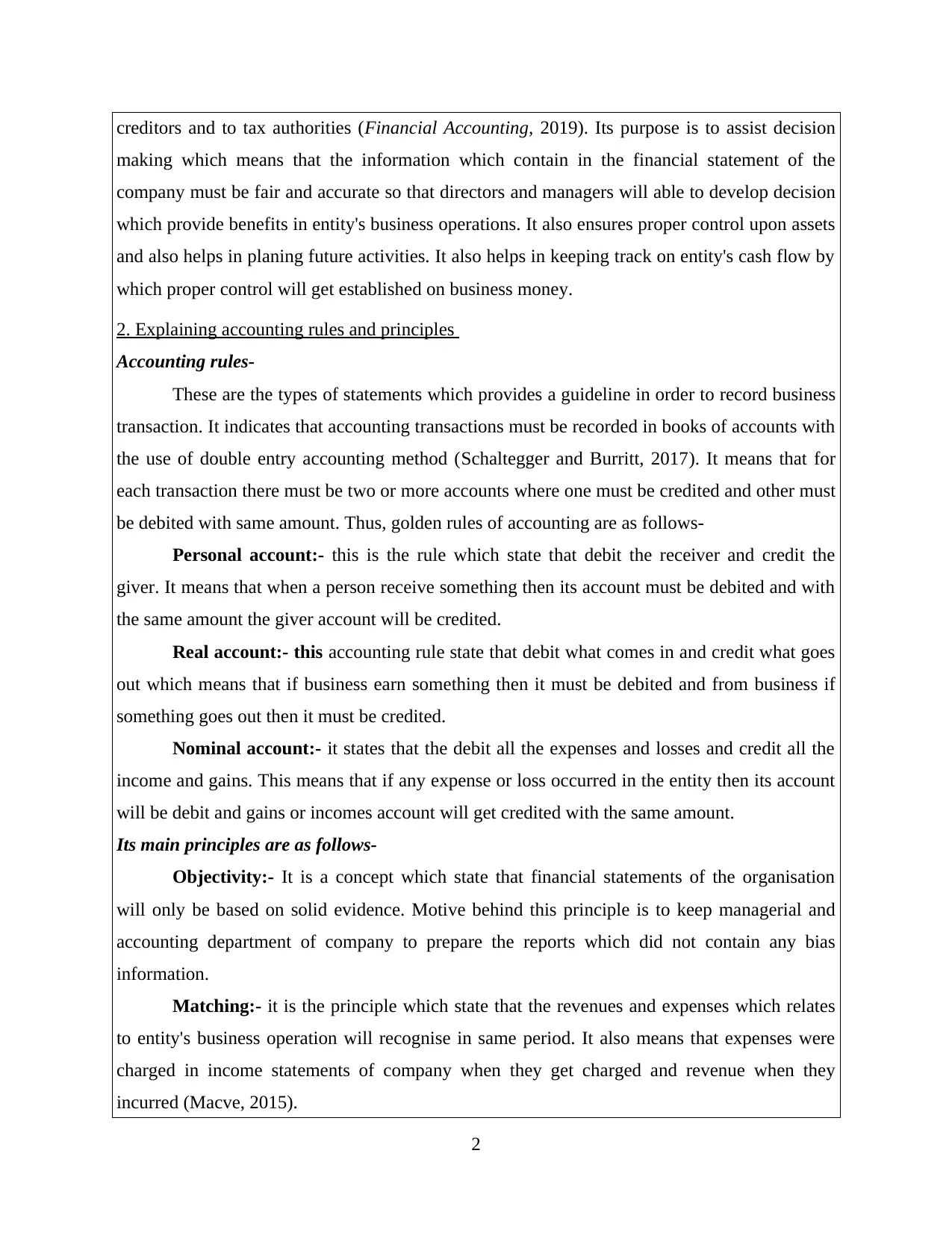
creditors and to tax authorities (Financial Accounting, 2019). Its purpose is to assist decision
making which means that the information which contain in the financial statement of the
company must be fair and accurate so that directors and managers will able to develop decision
which provide benefits in entity's business operations. It also ensures proper control upon assets
and also helps in planing future activities. It also helps in keeping track on entity's cash flow by
which proper control will get established on business money.
2. Explaining accounting rules and principles
Accounting rules-
These are the types of statements which provides a guideline in order to record business
transaction. It indicates that accounting transactions must be recorded in books of accounts with
the use of double entry accounting method (Schaltegger and Burritt, 2017). It means that for
each transaction there must be two or more accounts where one must be credited and other must
be debited with same amount. Thus, golden rules of accounting are as follows-
Personal account:- this is the rule which state that debit the receiver and credit the
giver. It means that when a person receive something then its account must be debited and with
the same amount the giver account will be credited.
Real account:- this accounting rule state that debit what comes in and credit what goes
out which means that if business earn something then it must be debited and from business if
something goes out then it must be credited.
Nominal account:- it states that the debit all the expenses and losses and credit all the
income and gains. This means that if any expense or loss occurred in the entity then its account
will be debit and gains or incomes account will get credited with the same amount.
Its main principles are as follows-
Objectivity:- It is a concept which state that financial statements of the organisation
will only be based on solid evidence. Motive behind this principle is to keep managerial and
accounting department of company to prepare the reports which did not contain any bias
information.
Matching:- it is the principle which state that the revenues and expenses which relates
to entity's business operation will recognise in same period. It also means that expenses were
charged in income statements of company when they get charged and revenue when they
incurred (Macve, 2015).
2
making which means that the information which contain in the financial statement of the
company must be fair and accurate so that directors and managers will able to develop decision
which provide benefits in entity's business operations. It also ensures proper control upon assets
and also helps in planing future activities. It also helps in keeping track on entity's cash flow by
which proper control will get established on business money.
2. Explaining accounting rules and principles
Accounting rules-
These are the types of statements which provides a guideline in order to record business
transaction. It indicates that accounting transactions must be recorded in books of accounts with
the use of double entry accounting method (Schaltegger and Burritt, 2017). It means that for
each transaction there must be two or more accounts where one must be credited and other must
be debited with same amount. Thus, golden rules of accounting are as follows-
Personal account:- this is the rule which state that debit the receiver and credit the
giver. It means that when a person receive something then its account must be debited and with
the same amount the giver account will be credited.
Real account:- this accounting rule state that debit what comes in and credit what goes
out which means that if business earn something then it must be debited and from business if
something goes out then it must be credited.
Nominal account:- it states that the debit all the expenses and losses and credit all the
income and gains. This means that if any expense or loss occurred in the entity then its account
will be debit and gains or incomes account will get credited with the same amount.
Its main principles are as follows-
Objectivity:- It is a concept which state that financial statements of the organisation
will only be based on solid evidence. Motive behind this principle is to keep managerial and
accounting department of company to prepare the reports which did not contain any bias
information.
Matching:- it is the principle which state that the revenues and expenses which relates
to entity's business operation will recognise in same period. It also means that expenses were
charged in income statements of company when they get charged and revenue when they
incurred (Macve, 2015).
2
⊘ This is a preview!⊘
Do you want full access?
Subscribe today to unlock all pages.

Trusted by 1+ million students worldwide
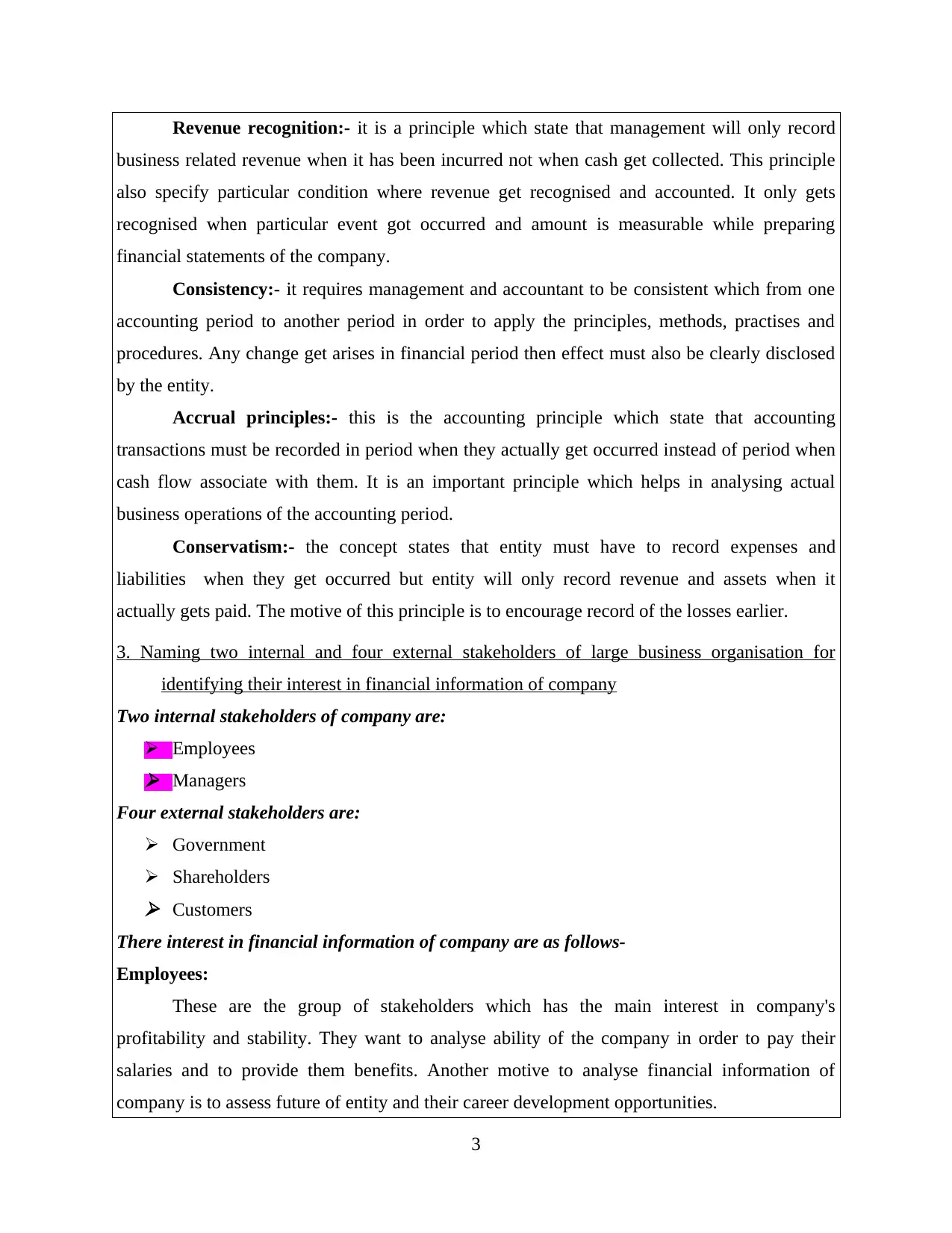
Revenue recognition:- it is a principle which state that management will only record
business related revenue when it has been incurred not when cash get collected. This principle
also specify particular condition where revenue get recognised and accounted. It only gets
recognised when particular event got occurred and amount is measurable while preparing
financial statements of the company.
Consistency:- it requires management and accountant to be consistent which from one
accounting period to another period in order to apply the principles, methods, practises and
procedures. Any change get arises in financial period then effect must also be clearly disclosed
by the entity.
Accrual principles:- this is the accounting principle which state that accounting
transactions must be recorded in period when they actually get occurred instead of period when
cash flow associate with them. It is an important principle which helps in analysing actual
business operations of the accounting period.
Conservatism:- the concept states that entity must have to record expenses and
liabilities when they get occurred but entity will only record revenue and assets when it
actually gets paid. The motive of this principle is to encourage record of the losses earlier.
3. Naming two internal and four external stakeholders of large business organisation for
identifying their interest in financial information of company
Two internal stakeholders of company are:
Employees Managers
Four external stakeholders are:
Government
Shareholders Customers
There interest in financial information of company are as follows-
Employees:
These are the group of stakeholders which has the main interest in company's
profitability and stability. They want to analyse ability of the company in order to pay their
salaries and to provide them benefits. Another motive to analyse financial information of
company is to assess future of entity and their career development opportunities.
3
business related revenue when it has been incurred not when cash get collected. This principle
also specify particular condition where revenue get recognised and accounted. It only gets
recognised when particular event got occurred and amount is measurable while preparing
financial statements of the company.
Consistency:- it requires management and accountant to be consistent which from one
accounting period to another period in order to apply the principles, methods, practises and
procedures. Any change get arises in financial period then effect must also be clearly disclosed
by the entity.
Accrual principles:- this is the accounting principle which state that accounting
transactions must be recorded in period when they actually get occurred instead of period when
cash flow associate with them. It is an important principle which helps in analysing actual
business operations of the accounting period.
Conservatism:- the concept states that entity must have to record expenses and
liabilities when they get occurred but entity will only record revenue and assets when it
actually gets paid. The motive of this principle is to encourage record of the losses earlier.
3. Naming two internal and four external stakeholders of large business organisation for
identifying their interest in financial information of company
Two internal stakeholders of company are:
Employees Managers
Four external stakeholders are:
Government
Shareholders Customers
There interest in financial information of company are as follows-
Employees:
These are the group of stakeholders which has the main interest in company's
profitability and stability. They want to analyse ability of the company in order to pay their
salaries and to provide them benefits. Another motive to analyse financial information of
company is to assess future of entity and their career development opportunities.
3
Paraphrase This Document
Need a fresh take? Get an instant paraphrase of this document with our AI Paraphraser
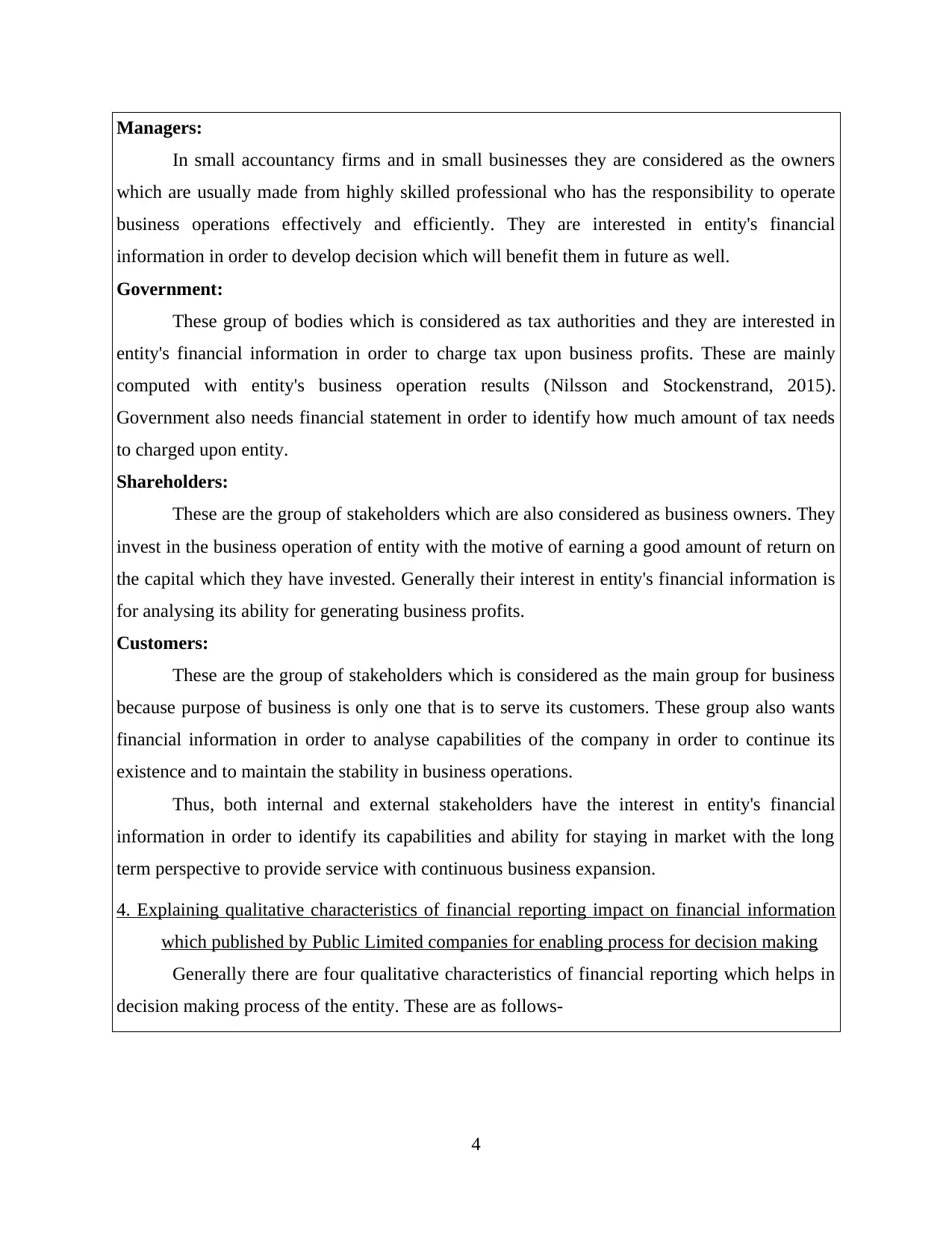
Managers:
In small accountancy firms and in small businesses they are considered as the owners
which are usually made from highly skilled professional who has the responsibility to operate
business operations effectively and efficiently. They are interested in entity's financial
information in order to develop decision which will benefit them in future as well.
Government:
These group of bodies which is considered as tax authorities and they are interested in
entity's financial information in order to charge tax upon business profits. These are mainly
computed with entity's business operation results (Nilsson and Stockenstrand, 2015).
Government also needs financial statement in order to identify how much amount of tax needs
to charged upon entity.
Shareholders:
These are the group of stakeholders which are also considered as business owners. They
invest in the business operation of entity with the motive of earning a good amount of return on
the capital which they have invested. Generally their interest in entity's financial information is
for analysing its ability for generating business profits.
Customers:
These are the group of stakeholders which is considered as the main group for business
because purpose of business is only one that is to serve its customers. These group also wants
financial information in order to analyse capabilities of the company in order to continue its
existence and to maintain the stability in business operations.
Thus, both internal and external stakeholders have the interest in entity's financial
information in order to identify its capabilities and ability for staying in market with the long
term perspective to provide service with continuous business expansion.
4. Explaining qualitative characteristics of financial reporting impact on financial information
which published by Public Limited companies for enabling process for decision making
Generally there are four qualitative characteristics of financial reporting which helps in
decision making process of the entity. These are as follows-
4
In small accountancy firms and in small businesses they are considered as the owners
which are usually made from highly skilled professional who has the responsibility to operate
business operations effectively and efficiently. They are interested in entity's financial
information in order to develop decision which will benefit them in future as well.
Government:
These group of bodies which is considered as tax authorities and they are interested in
entity's financial information in order to charge tax upon business profits. These are mainly
computed with entity's business operation results (Nilsson and Stockenstrand, 2015).
Government also needs financial statement in order to identify how much amount of tax needs
to charged upon entity.
Shareholders:
These are the group of stakeholders which are also considered as business owners. They
invest in the business operation of entity with the motive of earning a good amount of return on
the capital which they have invested. Generally their interest in entity's financial information is
for analysing its ability for generating business profits.
Customers:
These are the group of stakeholders which is considered as the main group for business
because purpose of business is only one that is to serve its customers. These group also wants
financial information in order to analyse capabilities of the company in order to continue its
existence and to maintain the stability in business operations.
Thus, both internal and external stakeholders have the interest in entity's financial
information in order to identify its capabilities and ability for staying in market with the long
term perspective to provide service with continuous business expansion.
4. Explaining qualitative characteristics of financial reporting impact on financial information
which published by Public Limited companies for enabling process for decision making
Generally there are four qualitative characteristics of financial reporting which helps in
decision making process of the entity. These are as follows-
4
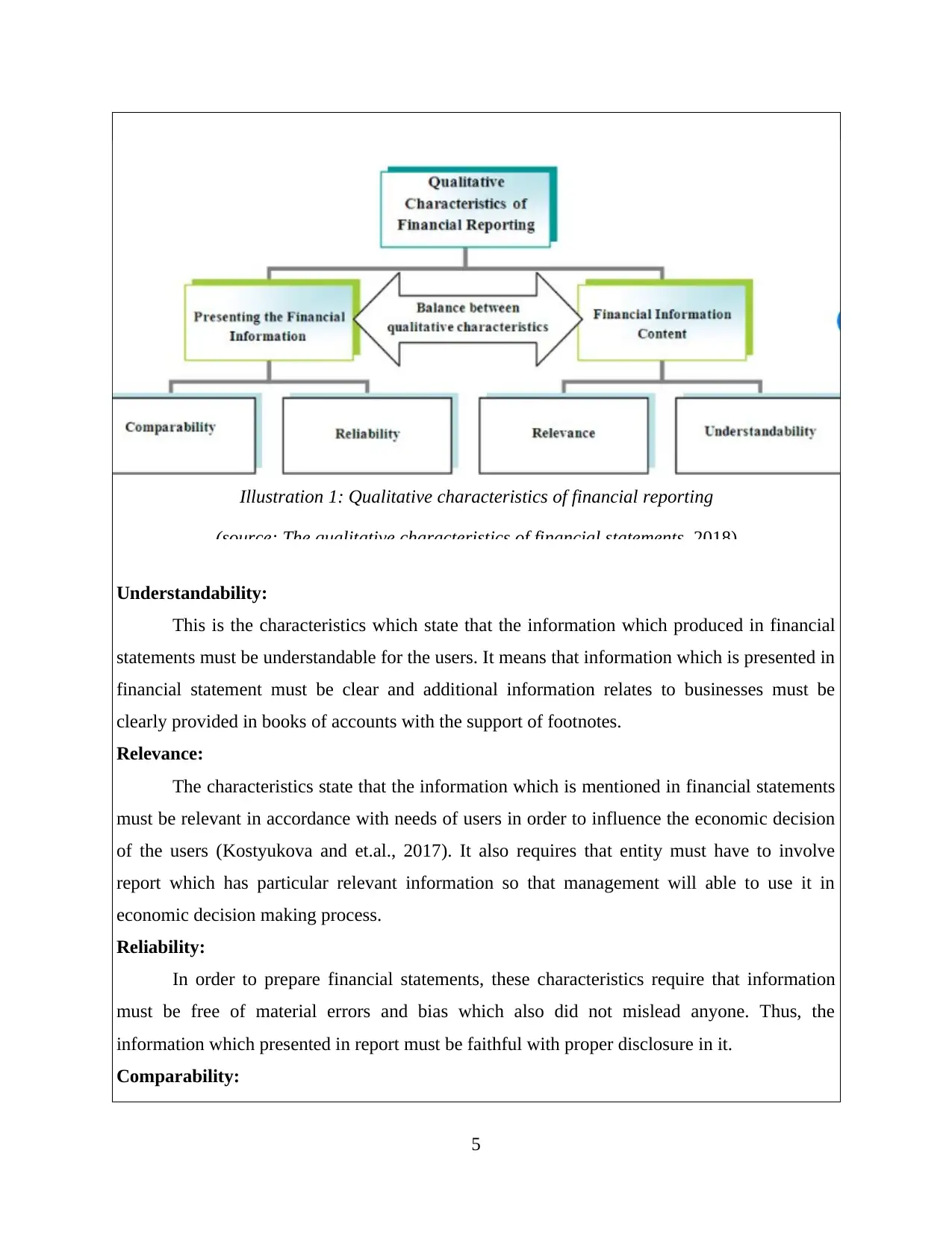
Understandability:
This is the characteristics which state that the information which produced in financial
statements must be understandable for the users. It means that information which is presented in
financial statement must be clear and additional information relates to businesses must be
clearly provided in books of accounts with the support of footnotes.
Relevance:
The characteristics state that the information which is mentioned in financial statements
must be relevant in accordance with needs of users in order to influence the economic decision
of the users (Kostyukova and et.al., 2017). It also requires that entity must have to involve
report which has particular relevant information so that management will able to use it in
economic decision making process.
Reliability:
In order to prepare financial statements, these characteristics require that information
must be free of material errors and bias which also did not mislead anyone. Thus, the
information which presented in report must be faithful with proper disclosure in it.
Comparability:
5
Illustration 1: Qualitative characteristics of financial reporting
(source: The qualitative characteristics of financial statements, 2018)
This is the characteristics which state that the information which produced in financial
statements must be understandable for the users. It means that information which is presented in
financial statement must be clear and additional information relates to businesses must be
clearly provided in books of accounts with the support of footnotes.
Relevance:
The characteristics state that the information which is mentioned in financial statements
must be relevant in accordance with needs of users in order to influence the economic decision
of the users (Kostyukova and et.al., 2017). It also requires that entity must have to involve
report which has particular relevant information so that management will able to use it in
economic decision making process.
Reliability:
In order to prepare financial statements, these characteristics require that information
must be free of material errors and bias which also did not mislead anyone. Thus, the
information which presented in report must be faithful with proper disclosure in it.
Comparability:
5
Illustration 1: Qualitative characteristics of financial reporting
(source: The qualitative characteristics of financial statements, 2018)
⊘ This is a preview!⊘
Do you want full access?
Subscribe today to unlock all pages.

Trusted by 1+ million students worldwide
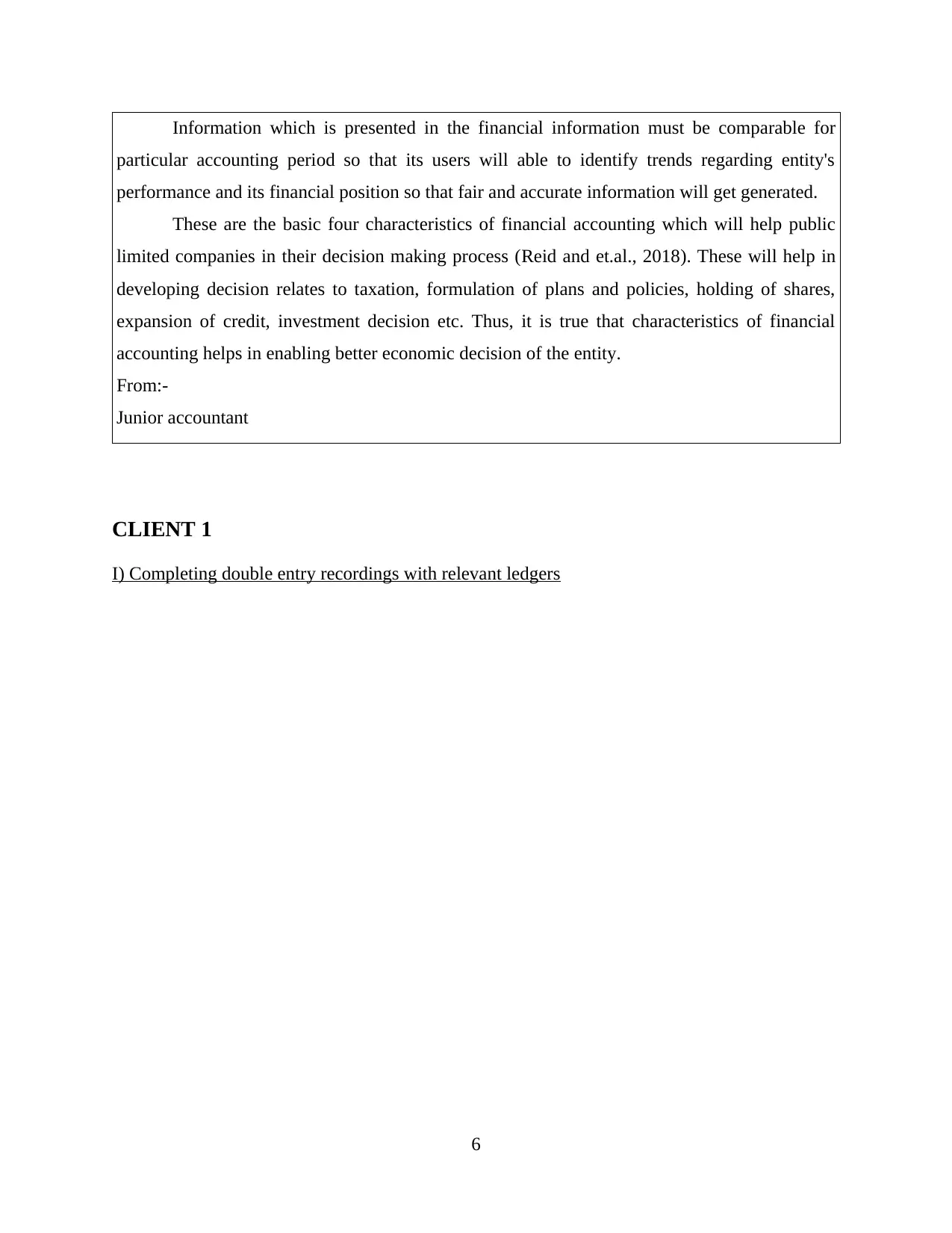
Information which is presented in the financial information must be comparable for
particular accounting period so that its users will able to identify trends regarding entity's
performance and its financial position so that fair and accurate information will get generated.
These are the basic four characteristics of financial accounting which will help public
limited companies in their decision making process (Reid and et.al., 2018). These will help in
developing decision relates to taxation, formulation of plans and policies, holding of shares,
expansion of credit, investment decision etc. Thus, it is true that characteristics of financial
accounting helps in enabling better economic decision of the entity.
From:-
Junior accountant
CLIENT 1
I) Completing double entry recordings with relevant ledgers
6
particular accounting period so that its users will able to identify trends regarding entity's
performance and its financial position so that fair and accurate information will get generated.
These are the basic four characteristics of financial accounting which will help public
limited companies in their decision making process (Reid and et.al., 2018). These will help in
developing decision relates to taxation, formulation of plans and policies, holding of shares,
expansion of credit, investment decision etc. Thus, it is true that characteristics of financial
accounting helps in enabling better economic decision of the entity.
From:-
Junior accountant
CLIENT 1
I) Completing double entry recordings with relevant ledgers
6
Paraphrase This Document
Need a fresh take? Get an instant paraphrase of this document with our AI Paraphraser
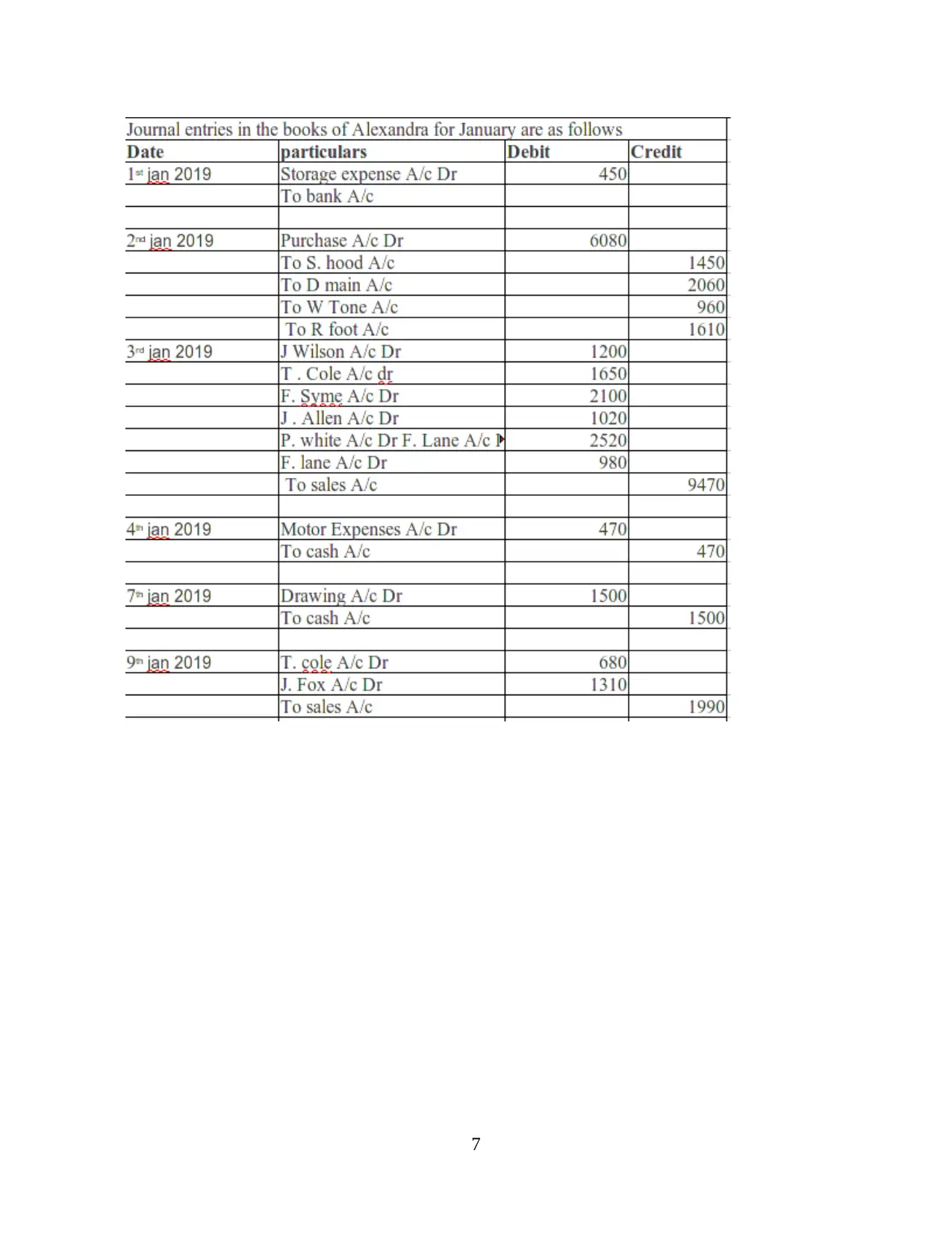
7
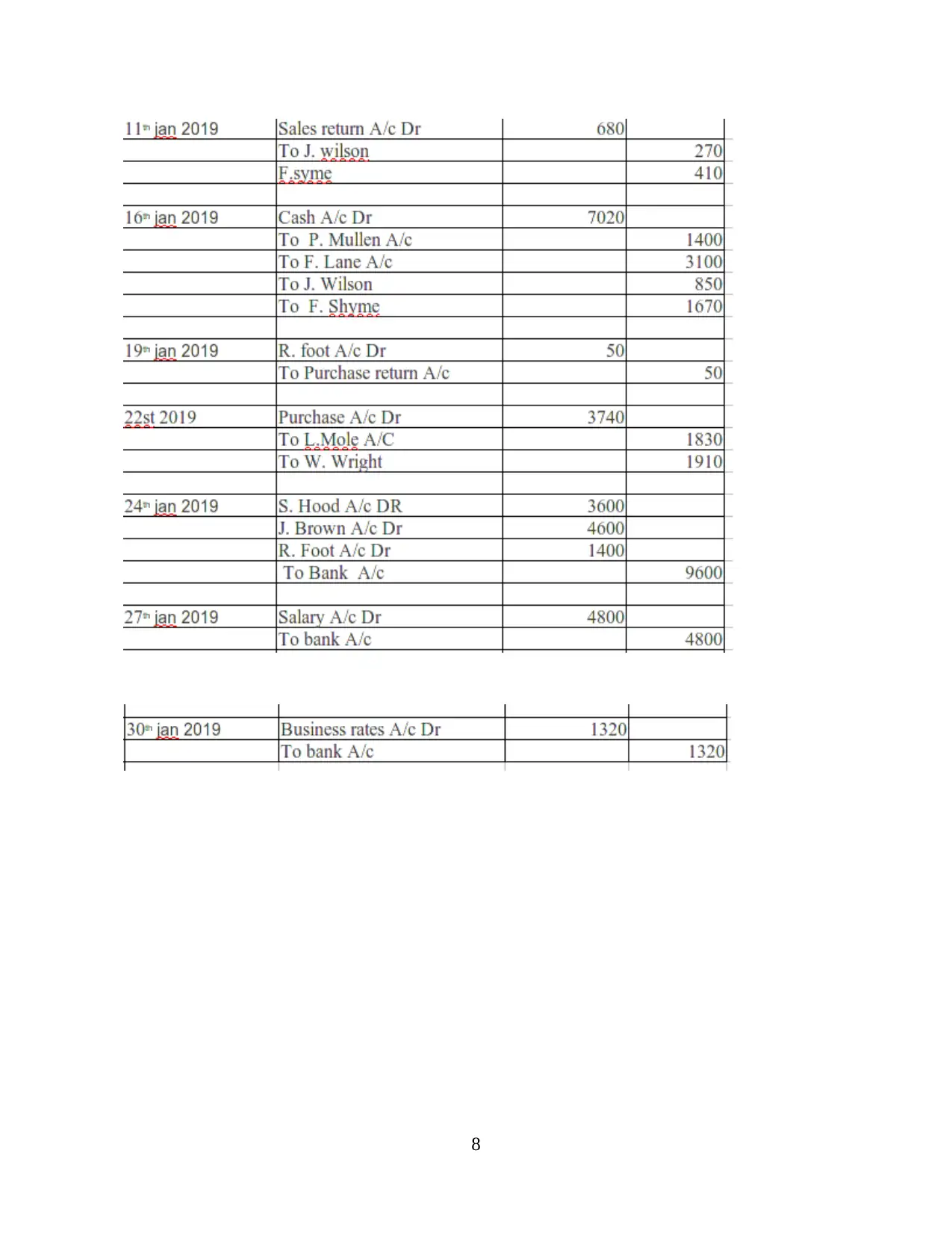
8
⊘ This is a preview!⊘
Do you want full access?
Subscribe today to unlock all pages.

Trusted by 1+ million students worldwide
1 out of 31
Related Documents
Your All-in-One AI-Powered Toolkit for Academic Success.
+13062052269
info@desklib.com
Available 24*7 on WhatsApp / Email
![[object Object]](/_next/static/media/star-bottom.7253800d.svg)
Unlock your academic potential
Copyright © 2020–2026 A2Z Services. All Rights Reserved. Developed and managed by ZUCOL.





